-
About
First-Year Application Deadline
Don't miss your chance to apply to Marist and join the Red Fox Family!
• Early Decision II and Regular Decision: Sunday, Feb. 15About
-
Academics
First-Year Application Deadline
Don't miss your chance to apply to Marist and join the Red Fox Family!
• Early Decision II and Regular Decision: Sunday, Feb. 15Academics
-
Admission & Financial Aid
First-Year Application Deadline
Don't miss your chance to apply to Marist and join the Red Fox Family!
• Early Decision II and Regular Decision: Sunday, Feb. 15Admission & Financial Aid
-
Student Life
First-Year Application Deadline
Don't miss your chance to apply to Marist and join the Red Fox Family!
• Early Decision II and Regular Decision: Sunday, Feb. 15Student Life
- Athletics
A man working in front of the computer
School of Management
October 2018
Students attend U.N. leadership program in Thailand
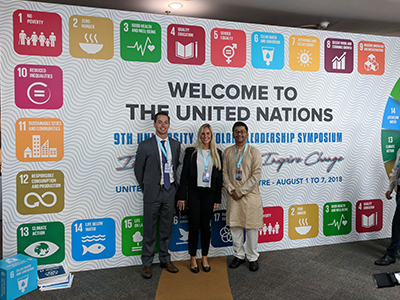
This was the first time that Marist students had been invited to attend the symposium, said Joanne Gavin, professor of management and associate dean for undergraduate programs, who accompanied the trio on the six-day trip. “The purpose was to bring students together from around the world to discuss and learn about humanitarian issues,” Gavin said. “The goal is to help the students understand the humanitarian crises going on around the world and to learn what they can do to get involved.”
The symposium featured presentations and workshops on the theme of “Inspiring Confidence, Inspiring Change.” Attendees also participated in a “Day of Service,” during which they took part in one of 15 activities ranging from painting a Bangkok school to chaperoning a group of underprivileged children during a visit to a local animal park. “They took what they learned [in the symposium] and applied it to a real situation,” Gavin said.
Prior to the trip, attendees were screened in order to identify possible student group leaders. Two of the three Red Foxes were selected in the first screening, with Schulman eventually being tapped as one of approximately 35 student leaders, Gavin said.
While the trip was a “great learning experience” that helped the students make contacts with peers from around the globe, the combination of jet lag, long days and hotel snafus made it very difficult, Gavin said. “We were beyond exhausted,” she admits. Undeterred, she is already brainstorming ways to ensure that future trips to this global event will run more smoothly.
IN THE PHOTO: From left: Seniors Jake Pallotti, Ariel Schulman and Prateek Samal at the United Nations University Scholar Leadership Symposium in Bangkok, Thailand
Prenting Fund award used for immigration study
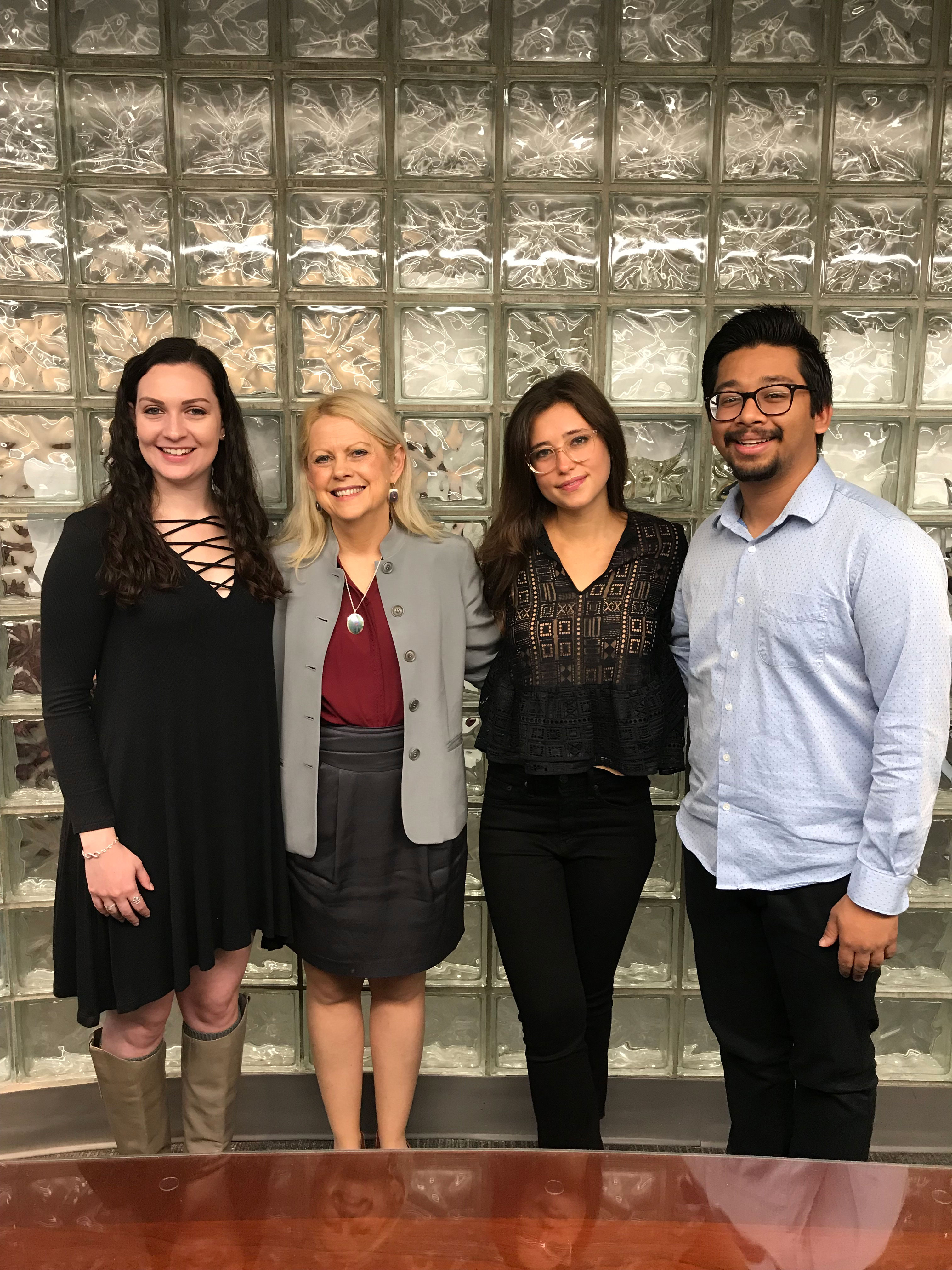
Since the award was announced, Weisberg and the students — Jessica Hasapis ’13, MBA ’18; Prateek Samal ’19; Gabriella Landicino ’19; Morgan O’Coin ’19; and Sydney Vacca ’18 — have been busy researching secondary materials, surveying and interviewing area businesses that employ immigrants, and contacting organizations that help immigrants obtain employment or establish their own new businesses. In June, the team provided a research report on the subject to Catholic Charities of the Archdiocese of New York, which will use the information to make decisions on allocation of grant funds received from the New York State Office of New Americans. Next month, the group will make a poster presentation of their findings at the Association for Public Policy Analysis and Management (APPAM) annual conference in Washington, D.C. They also plan to submit an article for journal publication at a future date.
Theodore “Ted” Prenting, professor emeritus of business and Marist Heritage Professor, established the Prenting Family Assistantship Fund as a memorial to Bernardine (Berni) Prenting and daughter Mary Nell Prenting. During his 37 years at Marist, Ted Prenting played a key role in designing the college’s business programs and in the helping the School of Management achieve AACSB accreditation.
“This has been such a great opportunity for me and for these great students to study and report on such a relevant and timely topic,” Weisberg said. “We can’t thank the Prenting family enough.”
IN THE PHOTO: From left: Morgan O'Coin ’19, Dr. Melinda Weisberg, Gabriella Landicino ’19, Prateek Samal ’19. Not shown: Sydney Vacca ’18 and Jessica Hasapis ’13/MBA ’18
Research Seminar Series hosts top-tier speakers
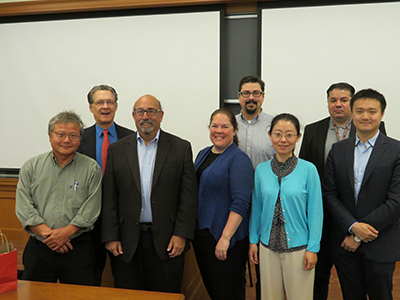
On Sept. 19, Dr. Douglas M. Boyle, accounting professor at the Kania School of Management at the University of Scranton, discussed market research findings related to business PhD programs. An accomplished researcher and author, Boyle is a CPA who worked as an auditor for KPMG Peat Marwick. He has received the Kania School of Management Teacher of The Year Award (twice) and the University of Scranton’s Provost Excellence in Research Award.
Robert H. Herz, executive-in-residence at Columbia Business School, spoke about sustainability accounting on Oct. 3. Herz served as the chairman of the Financial Accounting Standards Board from 2002 to 2010. Both a certified public accountant and a chartered accountant, he was a senior partner with PricewaterhouseCoopers and a member of the firm’s global and U.S. boards. He has authored numerous publications on accounting, auditing, and business subjects and coauthored the recently released book, The Value Reporting Revolution: Moving Beyond the Earnings Game.
Retired Prof. Richard Sylla will speak about “Changing Views of Hamilton's Place in U.S. History” on Nov. 7. An emeritus professor of finance at NYU’s Stern School of Business, he is an appointed member of the Federal Reserve System’s Centennial Advisory Council and an elected Fellow of the American Academy of Arts and Sciences. Sylla has authored 11 books on the history of finance; a particular research interest is Alexander Hamilton’s role in establishing the U.S. as a world financial leader.
The Research Seminar Series “is an important way to connect our faculty, management students and members of the public with leading scholars,” said Assistant Professor of Business Law Thomas M. Madden, the series organizer. Richard Sylla’s Nov. 7 lecture will commence at 12:30 p.m. in Lowell Thomas, Room 027. All are welcome to attend.
IN THE PHOTO: Robert Herz (third from left) with members of the SoM faculty
Students network at Meet the Firms event
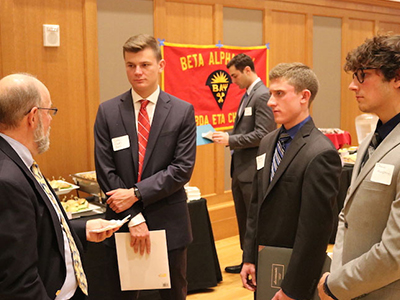
“Networking has become so important in the hiring process,” said SoM Dean Lawrence Singleton. “Offering our students the chance to speak directly to company reps allows them to make the vital connections that could lead to an internship or job offer down the road.”
Faculty Focus
SOM faculty members Pamela J. Harper and Detelin Elenkov each presented research papers at the annual meeting of the Academy of Management, which was held in Chicago in August. Harper discussed “Stakeholder Management Strategies and Determinants of Corporate Philanthropy” and participated in the “FLIPPED” Workshop at a teaching and learning mini-conference held in conjunction with the annual session. Elenkov presented “Building International Research Collaborations That Have Impact” and “Improving Student Lives Through International Teaching Collaborations.” Recently he was named editor of the Journal of Advancement in Applied Business Research.
“Business Graduate Competency Gaps: A Mandate for Curricular Reform,” a paper coauthored by SoM Accounting Professor Bonnie P. Stivers and Emmanuel Onifade of Morehouse College, was presented at the International Academy of Business and Economics conference held in New York City on Oct. 11-13. The paper will also be published in the International Journal of Business Strategy.
Terry M. Ciccaglione, SoM academic advisor and adjunct instructor, spent a portion of his summer break researching the political situation in Italy. A recipient of the Florence Faculty Research Appointment, Ciccaglione attempted to gauge the effectiveness of Prime Minister Giuseppe Conte’s coalition government, which faces mounting government debt, an 11 percent unemployment rate and out-of-control immigration. Ciccaglione met with business and academic contacts, including IMA Corp. Plant Manager Orazio Garozzo and Associate Professor Riccardo Fini of the Bologna Business School. “How the new government is going to help the economy is still tenuous,” Ciccaglione said. Eventually, he hopes to publish his research in article form.
Alumni Profile: Colleen Kopchik ’12, MA ’14, MBA ’16
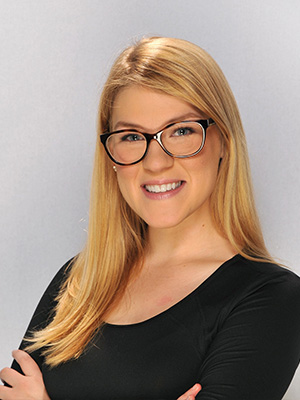
A resident of nearby Hopewell Junction, Kopchik began her Marist studies while still in high school by joining the college’s Bridge Program, “so it just naturally flowed that I would come here as a full-time student,” she says. After completing her bachelor’s degree in communications, she enrolled in the Integrated Marketing Communication (IMC) program, earning her master’s in 2014. Next up: completing her MBA. “Earning my MBA was more of a practical matter: We had to take some MBA courses when doing the IMC, so I thought, ‘well, why not just keep going?’ So I finished that, too.”
With her studies completed, Kopchik had a resume that would have opened doors just about anywhere. But she chose to launch her career at Marist. As a student, she had worked in the IT department, first in the data center and then for IT Vice President William Thirsk; later, she accepted a full-time position in the department’s Entrepreneurial Initiatives area. “I was lucky to get that opportunity,” she says now. “I was there for about four and a half years when I got a call from Lyn Lepre [dean of the School of Communications and the Arts] asking if I would consider coming over to the academic side — and I said yes. I was the interim assistant dean [of the school] for about a year and a half.”
Currently Kopchik is a visiting professor of communications. She is also the director of the Center for Social Media, a “data listening” initiative that launched last fall. “It’s really cool,” Kopchik enthuses. “Specifically, it runs Social Studio and Command Center, two Salesforce platforms that allow us to look at any publicly available social or digital media, videos, blogs, news aggregators — more than one billion digital data sources. We enter keywords — say, ‘Habitat for Humanity’ — into the system, and we can listen to conversations people are having [about that subject] and decide how to respond to them or position ourselves correctly if we are doing a marketing campaign.”
Last month, Kopchik was one of several staffers who discussed Marist’s utilization of this software at the annual Dreamforce convention in San Francisco. “These are industry-available tools that are usually used in business, but not academics,” she explains. “So we flipped it: We’re teaching students how to use these tools before they go into business. They learn not only how to pull these insights, but how to take action on them.”
When she’s not on the clock, Kopchik loves to travel (most recently to Peru and Iceland), and she is an “obsessive” fan of TV’s This Is Us. Ultimately, where does she think her career will take her? “I want to stay in the nonprofit industry in some way, probably in an organization that gives back globally,” she replies. “I love teaching, but down the road I think I want to expand beyond that. That’s all the insight I have so far — but when I figure it out, I’ll send you an update.”
Getting to know… Vernon Murray
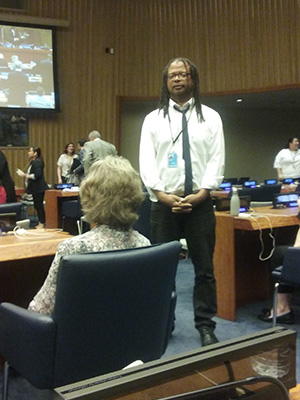
Q: Was becoming a college professor always your goal? Or did you do other things first?
A: When I finished my bachelor’s degree, I was interested in social science research; I like to think and analyze. One of my professors said I should do a PhD, but I thought that was insane — at that time, I couldn’t picture myself doing it.
When I did my MBA at Michigan State, I majored in hotel and restaurant management. When I got into the industry, it was very racist. I applied for many jobs, but they weren’t prepared for my demographic: an educated black man. So after about six months, I was looking for the door.
I was working as a catering manager at DePaul University when I met two African-American marketing professors at an event I was setting up. We had a conversation about what they did, and that’s what inspired me [to get my PhD]. I used to teach Bible studies and Sunday school, so I got into the teaching part of it that way.
Q: How and when did you start teaching at Marist?
A: I was teaching at DePaul. I had been given two years to finish my PhD dissertation, but I didn’t want to stay in Chicago. So I looked at my Rand McNally Road Atlas for colleges near New York City that had water close by, because I wanted to be able to keep kayaking; I had done lots of paddling on Lake Michigan. That’s how I found out that Marist existed. I sent my resume, and they happened to have an opening in marketing.
Q: Marketing of religion is one of your research interests. Can you discuss that?
A: Religions are some of the biggest marketers. They present ideological products for us to consume. All belief systems, religious or otherwise, do that. Now I’m studying the relationship between religion, human trafficking, and marketing. How do we develop a social marketing plan to fix the problem of human trafficking? Do we try to use religious leaders to send our message?
Q: You also work with Fang Protective Services. What does that involve?
A: My colleague in the psychology department, Sherry Dingman, founded Fang Protective Services. The organization’s goal is to show humanitarian workers how to be safer when they are working overseas. I’m a vice president (I don’t get any money). We have a small budget, but we’re growing.
The company became eligible to become members of the United Nations’ ECOSOC [Economic and Social Council] division. Since I do research on human trafficking, they allow me to attend those meetings; I also attended a UNICEF meeting on child trafficking. The subject is personal for me because of my own ancestry: I don’t want anyone to be a slave. I don’t care what color they are.
Q: What is one thing you hope students get from your classes?
A: The idea of a college education is intellectual stimulation; it’s not just a meal ticket. Students have to think for themselves and not just blindly trust people. People aren’t always honest, and they have agendas. I hope my students learn how to reach their own conclusions.
